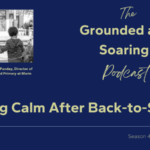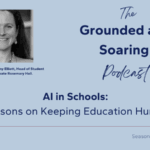Why Wonder Matters
Wonder fuels curiosity and resilience. In this conversation, Terry Dubow and Tree Sturman explore why wonder matters in childhood and how parents can protect that spark at home and in school.
Wonder fuels curiosity and resilience. In this conversation, Terry Dubow and Tree Sturman explore why wonder matters in childhood and how parents can protect that spark at home and in school.
In a world optimized for ease, children risk missing the growth that comes from struggle. Discover how Montessori education at Marin Montessori School gives kids safe, meaningful challenges that build resilience, confidence, and purpose.
In a world where young people are constantly targeted by algorithms, surrounded by misinformation, and often dismissed as passive consumers, learning to be a critical, confident creator isn’t just a nice-to-have—it’s essential.
Over three years, dozens of teens built a tiny home for a young person in need. What they gained in return can’t be measured in square feet.
At a time when adolescence is often framed in terms of anxiety and risk, what happens when young people are invited to explore this critical stage of life with curiosity and compassion?
What if summer wasn’t just time off—but time well used? In this episode of Grounded and Soaring, Marin Montessori Head of School Sam Shapiro talks with Dr. Christina Carroll, an Elementary Guide and educational researcher, about how families can rethink the summer months as a powerful opportunity for curiosity-driven learning.
What if homework isn’t helping? In an era of burnout, anxiety, and endless after-school worksheets, many families are asking a crucial question: Does more homework actually lead to deeper learning—or just more stress?
Traditional education rewards compliance over curiosity—but what if we designed schools differently? Join Terry Dubow, Scott Looney, and Bill Sneed as they discuss mastery-based learning, Montessori’s vision, and the changing landscape of success in education.
In Montessori, simple activities like folding a cloth are more than just tasks—they’re the building blocks for a child’s future academic and personal success. These moments teach concentration, resilience, and problem-solving, laying the groundwork for skills like advanced mathematics and critical thinking.
The three-year cycle of the Primary classroom culminates in what is often referred to as the kindergarten year. This final year is transformative. It’s a time when children apply the foundational skills they’ve been building since they were toddlers, step into leadership roles among their peers, and fully embrace the joy of learning independently.


